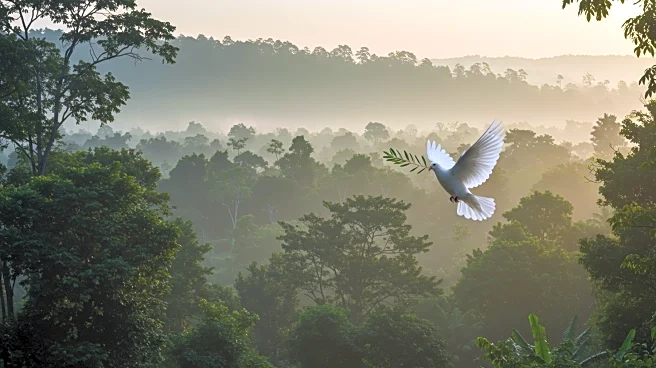What's Happening?
A new draft peace agreement has been shared between the Democratic Republic of Congo (DRC) and the M23 rebels as part of ongoing negotiations in Doha, facilitated by Qatar and the United States. Despite the timeline for the agreement not being met, both parties have expressed willingness to continue discussions. The fragile peace between Kinshasa and the M23 group has been tested recently, with the Congolese army accusing the rebels of new attacks in North Kivu. The M23 rebels have denied these allegations, claiming Congolese troops are undermining the Doha Declaration of Principles. This declaration, signed in July, was intended to serve as a framework for a comprehensive peace treaty. The U.S. has played a significant role in facilitating peace efforts, including the establishment of a Joint Oversight Committee to monitor the implementation of commitments under the agreement.
Why It's Important?
The peace draft represents a critical step towards resolving the long-standing conflict in the DRC, which has resulted in significant humanitarian challenges and regional instability. Successful negotiations could lead to a reduction in violence and improved security in North Kivu, benefiting local communities and potentially fostering economic development. The involvement of the United States and Qatar highlights the importance of international diplomacy in conflict resolution. A stable DRC could positively impact regional trade and cooperation, providing economic opportunities for neighboring countries. However, continued tensions and accusations between the parties underscore the challenges in achieving lasting peace.
What's Next?
Further negotiations are expected to take place in Doha, with both parties showing a willingness to continue discussions. The Joint Oversight Committee will play a crucial role in ensuring the commitments under the U.S.-brokered agreement are implemented. Regional diplomacy efforts, including summits with Eastern and Southern African leaders, may continue to support the peace process. The international community will likely monitor developments closely, with potential responses from major stakeholders depending on the progress of negotiations and the situation on the ground.
Beyond the Headlines
The peace process in the DRC could have broader implications for regional stability and international relations. Successful resolution of the conflict may serve as a model for other regions facing similar challenges. The involvement of international actors like the U.S. and Qatar highlights the role of global diplomacy in addressing complex conflicts. Long-term peace could lead to increased investment and development in the DRC, improving the lives of millions affected by years of violence.









